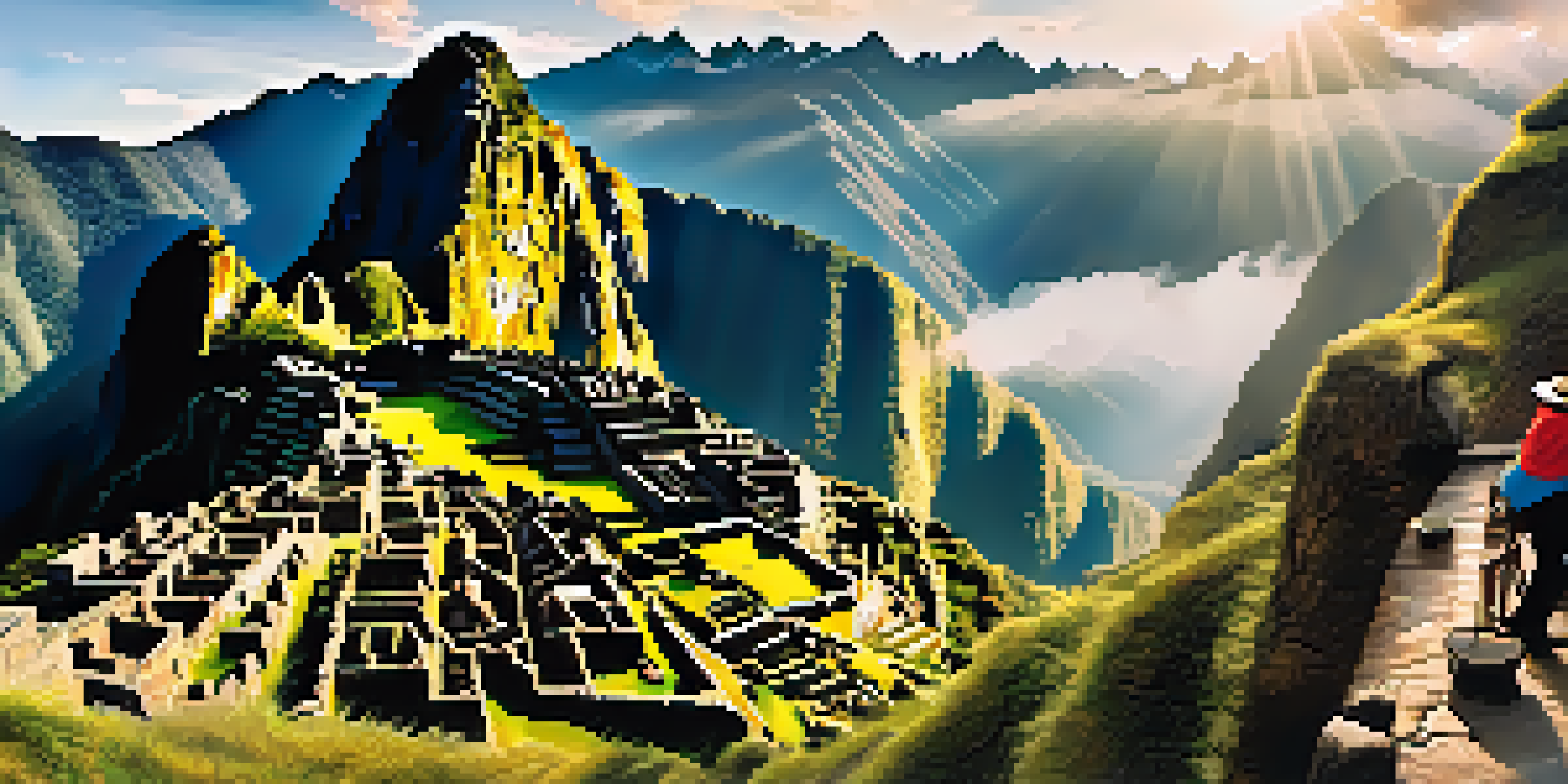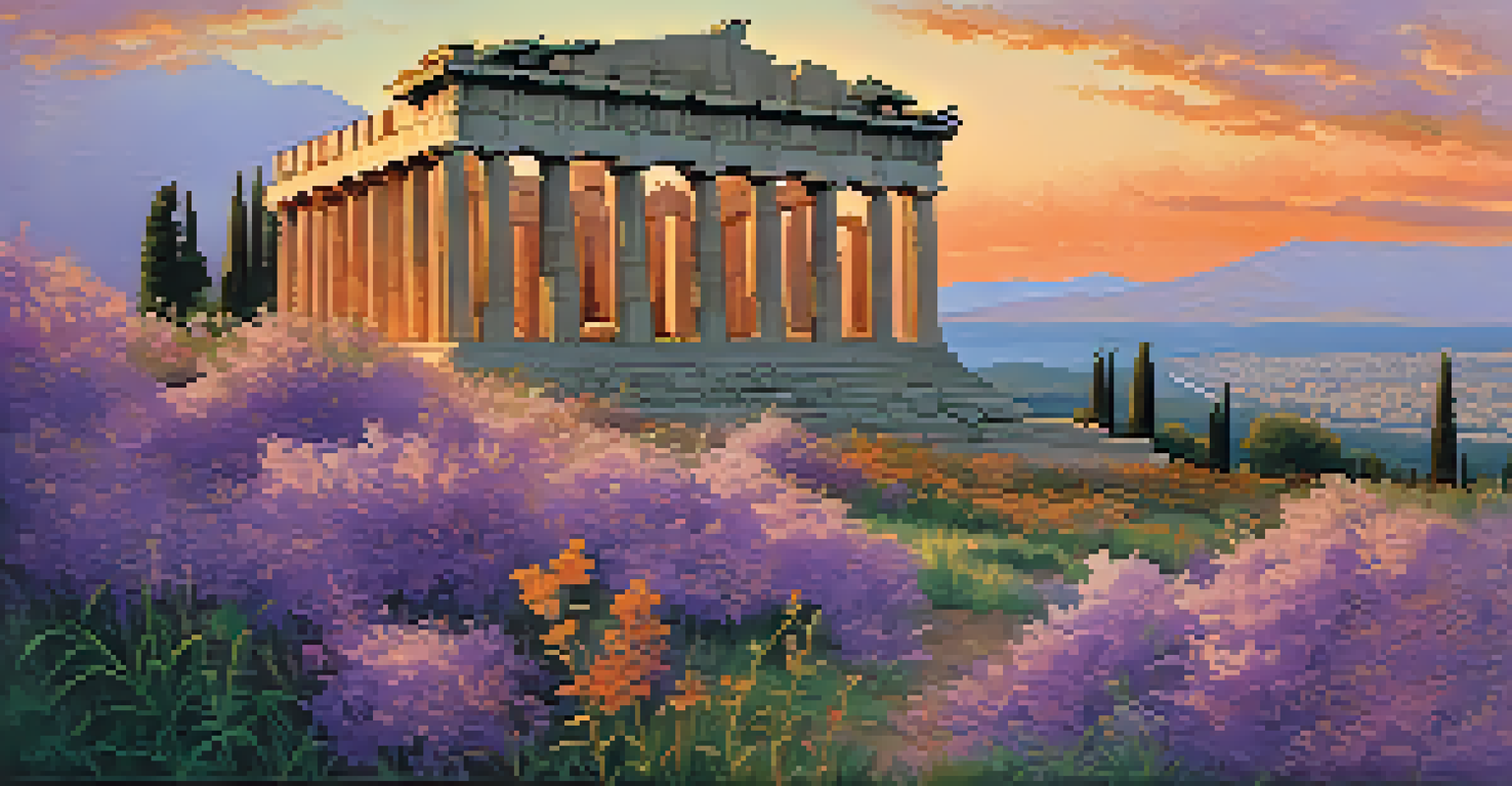Exploring Ancient Civilizations on Educational Tours

The Allure of Ancient Civilizations for Travelers
Ancient civilizations, like the Egyptians, Greeks, and Romans, captivate us with their rich histories and monumental achievements. When we think of these societies, we often picture grand structures, intricate art, and profound philosophies that still influence us today. Traveling to these sites allows us to step back in time, immersing ourselves in the stories that shaped human civilization.
The study of history is the beginning of political wisdom.
Educational tours provide a unique opportunity to learn directly from the source, guided by experts who bring history to life. Imagine walking through the ruins of Pompeii, feeling the weight of history in your footsteps as you explore the preserved streets. These experiences foster a deeper understanding of how ancient peoples lived, governed, and created art, resonating with our modern lives.
Moreover, visiting ancient sites often sparks curiosity and ignites a passion for history among travelers. Whether it’s the mystical pyramids of Giza or the majestic Parthenon, each destination offers lessons that transcend time. These tours not only educate but also inspire a sense of connection to our shared human journey.
Benefits of Educational Tours: Learning Beyond the Classroom
Educational tours are not just about observing; they are about engaging with history in a tangible way. Students and curious travelers alike benefit from hands-on experiences that textbooks simply can't replicate. For instance, participating in an archaeological dig can provide insights into ancient methods of construction and daily life, creating lasting memories and knowledge.

These tours also encourage critical thinking and discussion, as participants are often prompted to ask questions and explore theories about the past. Imagine standing in front of the ruins of Machu Picchu and contemplating how the Inca civilization thrived in the Andes Mountains. Such moments foster an appreciation for diverse cultures and their contributions to the world.
Explore History Through Travel
Traveling to ancient sites offers a unique opportunity to engage with history firsthand, deepening our understanding of past civilizations.
Furthermore, educational tours often incorporate local guides who share personal stories and insights, enhancing the learning experience. This connection adds depth to the journey, making history feel relevant and alive. Ultimately, these tours create a blend of education and adventure that can transform one’s perspective on history.
Choosing the Right Educational Tour for You
With a plethora of educational tours available, selecting the right one can feel overwhelming. Consider your interests: are you drawn to ancient architecture, cultural rituals, or perhaps the artifacts of a bygone era? Identifying your passions will help narrow down choices and ensure a fulfilling experience.
Traveling – it leaves you speechless, then turns you into a storyteller.
Researching the tour operators is also crucial. Look for companies that prioritize educational value, safety, and sustainability. Reading reviews and testimonials can offer insights into the experiences of previous travelers, helping you find a tour that aligns with your learning goals and travel style.
Lastly, consider the group size and dynamics. Smaller groups often allow for more personalized experiences and the opportunity to connect with fellow travelers. A good tour strikes a balance between education and enjoyment, ensuring that you return home enriched and inspired by your journey.
Popular Destinations for Exploring Ancient Civilizations
There are countless destinations worldwide that offer a glimpse into ancient civilizations, but some stand out for their unique contributions to history. For example, Greece is renowned for its ancient ruins and mythology, with sites like Delphi and the Acropolis drawing visitors from around the globe. Each location offers a fascinating glimpse into the life and beliefs of ancient Greeks.
In Egypt, the Pyramids of Giza and the temples of Luxor transport travelers to a time of pharaohs and gods. The intricate hieroglyphics and monumental architecture speak volumes about the civilization's achievements and beliefs. Walking among these ancient wonders can be a truly awe-inspiring experience.
Hands-On Learning Experiences
Educational tours provide hands-on experiences that textbooks can't replicate, fostering critical thinking and a lasting appreciation for diverse cultures.
Similarly, the ruins of the Maya civilization in Mexico and Central America, such as Chichen Itza and Tikal, offer insights into advanced societies that thrived long before European contact. Exploring these sites helps us appreciate the ingenuity and resilience of ancient peoples, enriching our understanding of human history.
The Role of Technology in Educational Tours
In today’s digital age, technology plays a significant role in enhancing educational tours. From virtual reality experiences that allow you to explore ancient cities from home to augmented reality applications that bring artifacts to life on-site, technology can deepen the educational experience. Imagine standing in front of the Colosseum, using an app that overlays what it once looked like during gladiator games.
Additionally, online platforms and resources make it easier for travelers to research and prepare for their tours. Many organizations now provide digital content, including documentaries and interactive maps, that can enrich your understanding of the destinations you'll visit. This preparation helps create a more immersive experience.
Lastly, social media allows travelers to share their experiences in real time, fostering a community of learners and history enthusiasts. By documenting their journeys, travelers contribute to a collective narrative of exploration and discovery, inspiring others to embark on their own educational adventures.
Connecting with Local Cultures During Tours
One of the most rewarding aspects of educational tours is the opportunity to connect with local cultures. Engaging with communities allows travelers to gain insights into how ancient traditions influence modern life. For instance, participating in a traditional dance or cooking class can deepen your appreciation for a culture's heritage.
Local guides often serve as bridges between travelers and the culture, sharing stories, customs, and practices that might be overlooked in a typical tourist experience. This cultural exchange enriches the journey, fostering mutual respect and understanding. It’s a reminder that history is not just in the past, but alive in the present.
Preservation for Future Generations
It's crucial to prioritize the preservation of ancient sites to ensure future generations can also appreciate and learn from our shared history.
Moreover, supporting local artisans and businesses during your travels helps sustain these cultures. Purchasing handmade crafts or enjoying local cuisine not only enhances your experience but also contributes to the community's economy. This symbiotic relationship between travelers and locals can lead to more meaningful and enriching educational experiences.
Preserving Ancient Sites for Future Generations
As we explore ancient civilizations, the importance of preserving these sites for future generations becomes increasingly clear. Many historical landmarks are facing threats from tourism, climate change, and urban development. Educational tours can play a role in conservation by promoting responsible travel practices and raising awareness about the fragility of these sites.
Organizations and tour operators are beginning to implement sustainable practices that minimize environmental impact and protect cultural heritage. This might include limiting the number of visitors to sensitive sites or offering educational programs that emphasize the importance of preservation. Travelers can contribute by respecting guidelines and supporting efforts to maintain these historical treasures.

Ultimately, the goal is to ensure that future generations can also experience the wonders of ancient civilizations. By prioritizing preservation, we honor the past while creating a sustainable future for cultural exploration. It’s a shared responsibility that enhances our collective appreciation for our world’s diverse histories.